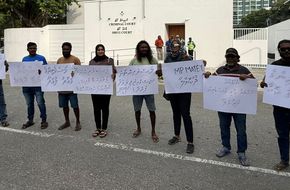
“If you build in Britain, we will back you”
The UK's High Commissioner on Britain's pitch to investors.
16 hours ago
Support independent journalism

Episode 14: Suspended without pay – when decentralisation becomes punishment
Suspended without pay, Hoarafushi Council President Mohamed Waheed reflects on due process, accountability, and decentralised governance.
13 Dec, 4:05 PM
Community policing belongs in the law. Don't gut it.
A former commissioner warns against dismantling trust-building reforms.
11 Dec, 5:43 PM

Banyans and saplings: 100 years old, replaced by inches tall
Ministry scrubbed tree height guidelines after replacing century-old banyans with inch-tall saplings.
10 Dec, 6:01 PM

Trousers for girls, beards for boys: school uniform policy reignites Maldives culture war
Girls must wear trousers from age nine under the new rules.
09 Dec, 6:18 PM

Why Maldivian courts have every right to try the FAM corruption case
Former PG Hussain Shameem dismantles the FIFA defence.
08 Dec, 4:56 PM

Death penalty for drug traffickers: What the new law says
Sweeping changes to sentencing, scheduling and rehabilitation.
07 Dec, 10:00 PM





























